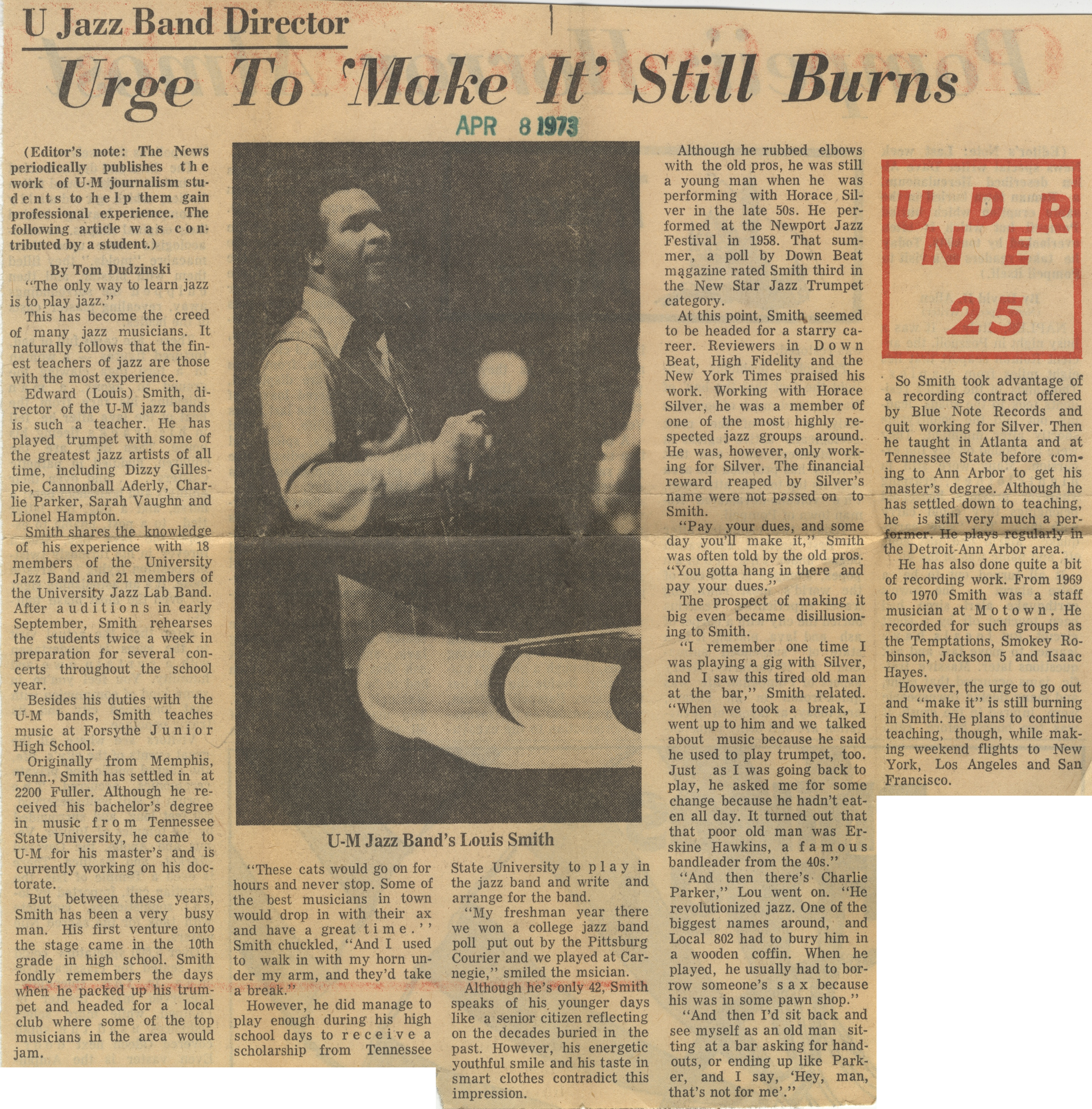Urge To 'Make It' Still Burns

U Jazz Band Director
Urge To 'Make It' Still Burns
(Editor’s note: The News periodically publishes the work of U-M journalism students to help them gain professional experience. The following article was contributed by a student.)
By Tom Dudzinski
“The only way to learn jazz is to play jazz.”
This has become the creed of many jazz musicians. It naturally follows that the finest teachers of jazz are those with the most experience.
Edward (Louis) Smith, director of the U-M jazz bands is such a teacher. He has played trumpet with some of the greatest jazz artists of all time, including Dizzy Gillespie, Cannonball Aderly, Charlie Parker, Sarah Vaughn and Lionel Hampton.
Smith shares the knowledge of his experience with 18 members of the University Jazz Band and 21 members of the University Jazz Lab Band. After auditions in early September, Smith rehearses the students twice a week in preparation for several concerts throughout the school year.
Besides his duties with the U-M bands, Smith teaches music at Forsythe Junior High School.
Originally from Memphis, Tenn., Smith has settled in at 2200 Fuller. Although he received his bachelor’s degree in music from Tennessee State University, he came to U-M for his master’s and is currently working on his doctorate.
But between these years, Smith has been a very busy man. His first venture onto the stage came in the 10th grade in high school. Smith fondly remembers the days When he packed up his trumpet and headed for a local club where some of the top musicians in the area would jam.
“These cats would go on for hours and never stop. Some of the best musicians in town would drop in with their ax and have a great time.’’ Smith chuckled. “And I used to walk in with my horn under my arm, and they’d take a break.”
However, he did manage to play enough during his high school days to receive a scholarship from Tennessee State University to play in the jazz band and write and arrange for the band.
“My freshman year there we won a college jazz band poll put out by the Pittsburg Courier and we played at Carnegie,” smiled the musician.
Although he’s only 42, Smith speaks of his younger days like a senior citizen reflecting on the decades buried in the past. However, his energetic youthful smile and his taste in smart clothes contradict this impression.
Although he rubbed elbows with the old pros, he was still a young man when he was performing with Horace Silver in the late 50s. He performed at the Newport Jazz Festival in 1958. That summer, a poll by Down Beat magazine rated Smith third in the New Star Jazz Trumpet category.
At this point, Smith, seemed to be headed for a starry career. Reviewers in Down Beat, High Fidelity and the New York Times praised his work. Working with Horace Silver, he was a member of one of the most highly respected jazz groups around. He was, however, only working for Silver. The financial reward reaped by Silver’s name were not passed on to Smith.
“Pay your dues, and someday you'll make it” Smith was often told by the old pros. “You gotta hang in there and pay your dues.”
The prospect of making it big even became disillusioning to Smith.
“I remember one time I was playing a gig with Silver, and I saw this tired old man at the bar,” Smith related. "When we took a break, I went up to him and we talked about music because he said he used to play trumpet, too. Just as I was going back to play, he asked me for some change because he hadn’t eaten all day. It turned out that that poor old man was Erskine Hawkins, a famous bandleader from the 40s.”
“And then there’s Charlie Parker,” Lou went on. “He revolutionized jazz. One of the biggest names around, and Local 802 had to bury him in a wooden coffin. When he played, he usually had to borrow someone’s sax because his was in some pawn shop.”
“And then I’d sit back and see myself as an old man sitting at a bar asking for handouts, or ending up like Parker, and I say, ‘Hey, man, that’s not for me’.”
So Smith took advantage of a recording contract offered by Blue Note Records and quit working for Silver. Then he taught in Atlanta and at Tennessee State before coming to Ann Arbor to get his master’s degree. Although he has settled down to teaching, he is still very much a performer. He plays regularly in the Detroit-Ann Arbor area.
He has also done quite a bit of recording work. From 1969 to 1970 Smith was a staff musician at Motown. He recorded for such groups as the Temptations, Smokey Robinson, Jackson 5 and Isaac Hayes.
However, the urge to go out and “make it” is still burning in Smith. He plans to continue teaching, though, while making weekend flights to New York, Los Angeles and San Francisco.